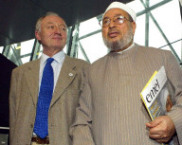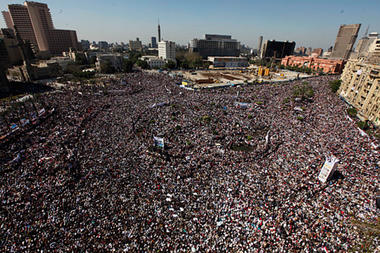The Irish Independent reports: “immigration officials have been concerned about him for some time and have blocked his entry to Ireland for the past three years. A visa application made by Mr Al-Qaradawi in June 2008 was refused. Since then he has been ‘red flagged’. This means he would be arrested and immediately deported if he turned up at an Irish port of entry. The decision is believed to have been made after consultation with other governments who imposed similar bans. No official reason was given for the red flagging and it is unclear if other religious figures have been the subject of similar bans.”
Update: Over at Harry’s Place the inimitable Edmund Standing predictably applauds the decision to exclude Qaradawi, under the headline “Ireland refuses entry to notorious fascist activist”. In support of the assertion that Qaradawi is a fascist, Standing provides a link to a 2004 article from Arab News and claims that “2,500 Muslim intellectuals from 23 countries” signed a petition attacking Qaradawi as a promoter of terrorism and asking the United Nations to take action against him.
What was the background to this petition? As HP’s favourite website MEMRI reported: “The idea to petition the U.N. with this request was raised by the Jordanian writer and researcher Dr. Shaker Al-Nabulsi in early September 2004, in response to the fatwa issued by Sheikh Yousef Al-Qaradhawi … which called for the abduction and killing of U.S. citizens in Iraq.”
But Qaradawi didn’t call for the abduction and killing of US civilians in Iraq – on the contrary, he vigorously opposed it. Qaradawi himself immediately denied that he had made the statement attributed to him, and this was confirmed by the leading Egyptian journalist Fahmi Huwaydi, who acquired a tape of the meeting where Qaradawi was supposed to have issued the call. After arguing that the people of Iraq were obliged to resist the US occupation by force of arms, Qaradawi continued: “the constitution of war in Islam is a constitution of ethics, and by those rules we must not kill except those who kill us, and therefore all of those who do not carry weapons it is not upon us to kill”.
Huwaydi condemned “the distortion which these words have received, and the clamour which it aroused in world capitals”. He pointed out that Qaradawi had held a press conference to refute the misrepresentation of his views “which was attended by some members of the American and French embassies at the side of a large number of journalists and media, where he said ‘Islam does not permit kidnapping of civilians or their killing’ … but his corrections have been completely ignored, and everyone continues to deal with the first position attributed to him rather than the truth”.
Shaker Al-Nabulsi was part of a tendency calling themselves “neo-liberals” who, in Nabulsi’s own words, advocated “freedom, democracy, and free markets” in the Middle East and, “in light of the inability of the domestic elite and the fragile political parties” to achieve these objectives, saw “no harm in asking for assistance from outside forces”.
Al-Jazeera journalist Faysal al-Qassem criticised Nabulsi and his co-thinkers as follows: “Are they not closer to the neo-conservative Americans who are destroying the world, than to the real liberals…? … Why do they lean blindly toward anything Western? … Why do they depict America as a benevolent angel who has come to save us from our evils? … How is it that the neo-liberal Arabs call for tolerance while taking the lead in accusing [others] of heresy? Doesn’t liberalism advocate acceptance of others and interaction with all factions? Why are they antagonistic to anyone who opposes them? Is this Liberalism or a repulsive Fundamentalism? Are they anything more than a fifth column?”
As Raymond Baker demonstrated in his book Islam Without Fear, Qaradawi is part of a reformist Islamist tendency which urges political change but, in contrast to the “neo-liberals”, rejects Western hegemony and seeks to promote an indigenous democratisation movement. Islam Online reported Qaradawi as saying in August 2004 that, whereas Washington “seeks a kind of change serving its own interests” in the Middle East, the reform that Muslims want is one “which is emanating from inside, and that serves their own interests and visions”.
This approach, which has of course borne fruit in the Arab Spring, brought Qaradawi into conflict with the pro-US perspectives of Nabulsi and the “neo-liberals”. After Qaradawi gave a talk in June 2004 stressing that “democracy is the essence of Islam”, rather than welcome this as a contribution to the struggle for democratisation Nabulsi instead launched a bitter attack on Qaradawi, declaring that “the term ‘democracy’ does not exist at all in Islam”.
The petition to the UN organised by Nabulsi was an integral part of this campaign to discredit Qaradawi and reformist currents within Islamism, by portraying them as no different from the supporters of Al-Qaeda. Thus the leading moderates Qaradawi, his fellow Egyptian “New Islamist” Mohammed al-Ghazali and the Tunisian democrat Rachid al-Ghannouchi were lumped together with two Saudi Wahhabists who were quoted as supporting the 9/11 attacks. All were categorised by the authors of the petition as “psychotic members of dogmatic Muslim groups encouraging the commission of terrorist acts in the name of and under the banner of Islam”.
(It is also worth mentioning that another of the individuals behind the petition against Qaradawi was Nabulsi’s friend Jawad Hashim, who was convicted in absentia in the United Arab Emirates of embezzlement from the Arab Monetary Fund. In a further court case in Britain he was ordered to repay over $130 million to the AMF. Before that, Hashim was Saddam Hussein’s minister of planning.)
As for Standing’s assertion that “2,500 Muslim intellectuals from 23 countries” signed the petition, by the end of 2004 the number of signatories reportedly came to 4,000. But these were just random individuals who had visited the website of the online journal Middle East Transparent which carried the petition. Since the publisher was claiming “2,000 to 3,000 visitors per day” to the site at the time, we would have to conclude that only a tiny minority of them actually supported the petition.
So the Arab News report that Standing quotes against Qaradawi is basically a load of nonsense. Standing knows nothing about the issues, hasn’t bothered to check his sources and just repeats slanders in an attempt to discredit a leading supporter of the Palestinian cause in order to promote HP’s Zionist agenda.
But what can you expect from Edmund Standing, other than ignorant idiocy? After all this is a man who has seriously argued that the BNP don’t really hate Muslims and recently presented a joke by Shahid Malik as evidence that the former Labour MP was plotting the Islamification of parliament.


 LGBTory, the Conservative LGBT group, today called for Ken Livingstone to be banned from this weekend’s London Pride.
LGBTory, the Conservative LGBT group, today called for Ken Livingstone to be banned from this weekend’s London Pride.